Meet some of the standards that are all around us – World Standards Day 2024
Our lives are touched by standards in many unseen ways. From the ground we walk on and the appliances in our homes to the food on our plates – standards are everywhere! ECOS seeks to make them better for the environment. Read on to get to know some of the standards we’ve been working on this year.
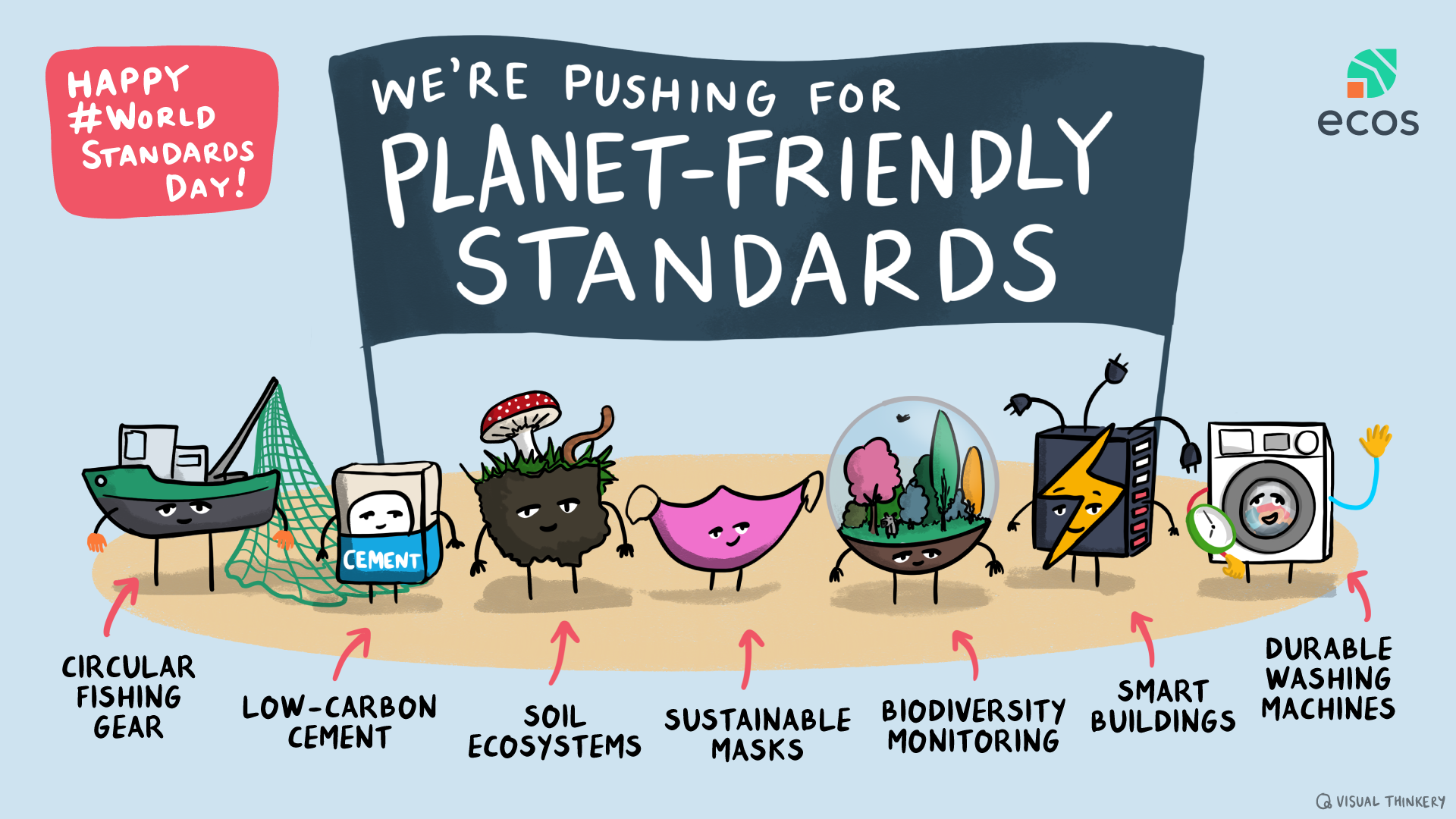
Have you ever wondered why your office printer is full of A4-sized paper? Or why electronic devices in Europe will soon use a USB-C cable? That is what standards can do.
Standards can be used to agree on how products are made, how they perform, or how they are marketed. They offer a set of rules, guidelines, or definitions that can make a task repeatable and uniform across companies, organisations, and regions.
Standards are voluntary tools, but they can point entire industries in a certain direction, and they often underpin mandatory laws. They have a big impact, so they should work for the environment – that’s where ECOS comes in!
ECOS is the only international environmental NGO working on standards. We give the environmental perspective when standards are developed, advocating strong environmental principles to promote sustainability and circularity. When we get standards right, they can positively impact us all.
World Standards Day 2024
Every year on 14 October, we celebrate World Standards Day. For 23 years, ECOS and its members have been active in the global standardisation system, raising the environmental voice and pushing for ambitious, inclusive standards through collaboration with – for example – ISO, IEC, CEN, CENELEC, ETSI, ITU, and, most recently, ARSO.
Today, we unite to celebrate all the ways in which standards can be designed to serve the environment. Meet some of 2024’s main characters for the ECOS team.
EN 50731: Extending the life of washing machines
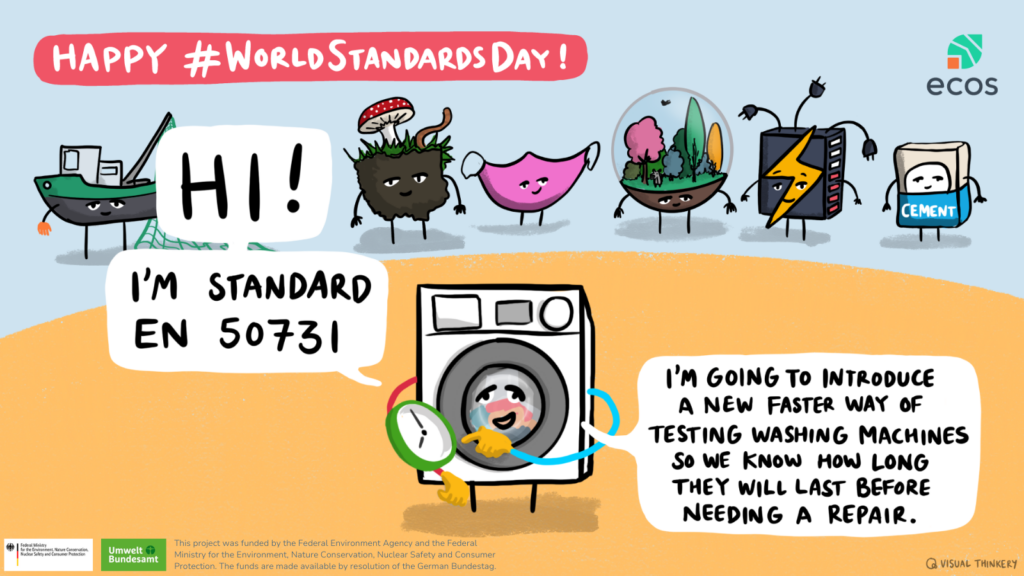
More than nine out of ten European households have a washing machine. While their energy efficiency has improved over the years, their overall durability still leaves a lot to be desired. Ensuring these appliances last for a long time is crucial if we want to manage global resources sustainably.
Washing machines must be tested properly before they enter the market to ensure they are reliable and long-lasting. But until now this has been a slow process. European standardiser CENELEC has a new, faster test methodology for washing machines in the pipeline (EN 50731), meaning that positive change for manufacturers and consumers could be just around the corner.
Find out more in this blog.
EN 17988 series: Making fishing gear more circular
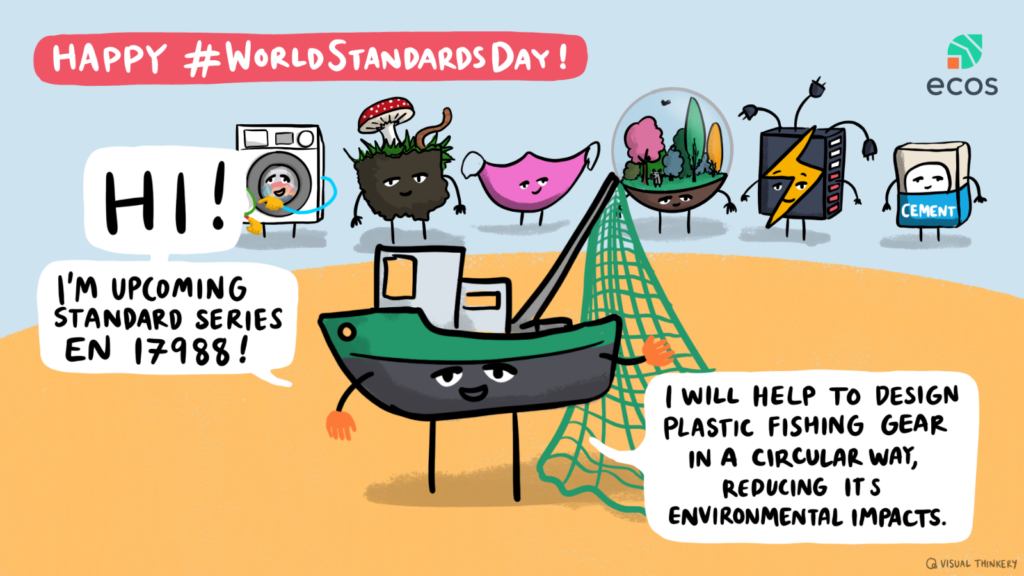
Over 10% of plastic in our oceans comes from fishing gear and related items – the second most common plastic items found in the sea. This amounts to hundreds of thousands of tonnes of plastic every year, causing widespread damage to marine animals, fauna, flora, and habitats.
A new European standard series (EN 17988, Parts 1 to 6) is about to make the design of plastic fishing gear and aquaculture equipment more circular. This will help to reduce marine plastics and microplastics in our oceans that harm wildlife.
These standards consider the waste hierarchy at every stage of a fishing product’s life – including repairability, modularity, and increased use of recycled materials. They also set sustainability principles to reduce the negative environmental impacts of fishing gear – before and after use.
Find out more in this blog.
ISO/TS 18718 and 18721: Defining the functions of soil
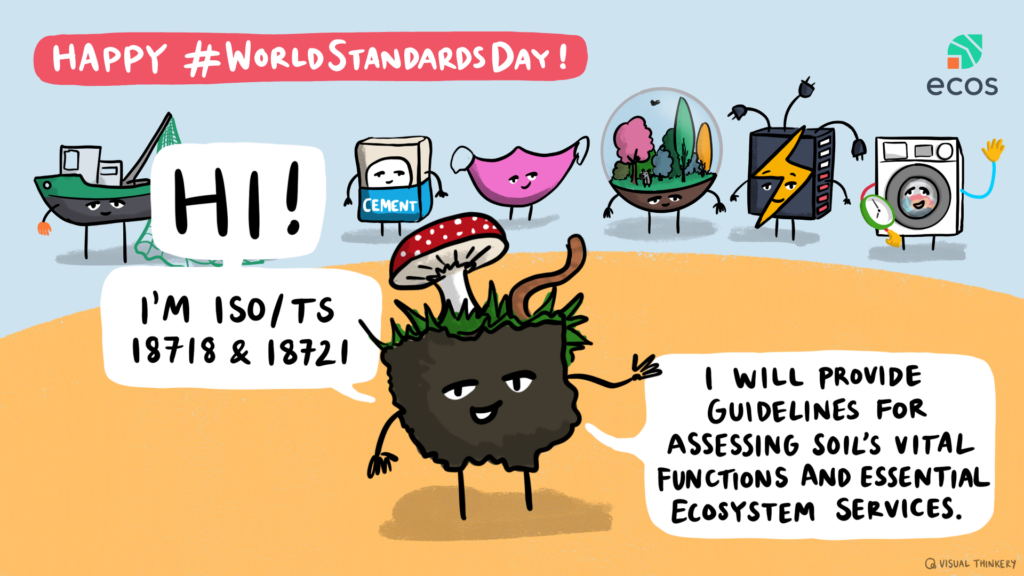
Every day we take soil for granted – but there is a whole world beneath our feet, hidden from view, that is teeming with life. From microbes to mammals, soil is considered home to more than half of the species on Earth, making it the most biodiverse singular habitat.
Healthy soils are key to human existence, but how do we define whether soils are healthy or not? Standards can help!
ISO is working on two new Technical Specifications (ISO/TS 18718 and 18721) to establish definitions and descriptions for soil functions and soil-related ecosystem services, as well as to provide guidelines on indicators and methodologies for their assessment.
Find out more in this blog.
Bringing standards to biodiversity monitoring
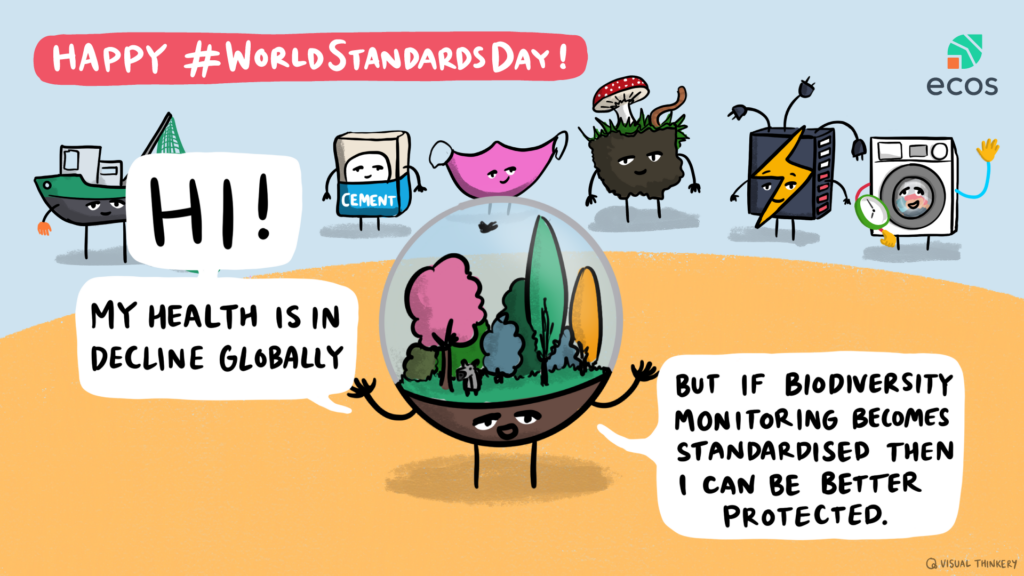
Nature is all around us, giving and sustaining life. Protecting and restoring ecosystems has many benefits: securing a stable food supply, increasing climate resilience, regulating carbon dioxide levels with plants and healthy oceans, improving environmental health and therefore human health, and creating habitats for species.
We all have a duty to protect nature – and standards can play a role, guiding the action of private and public organisations towards taking better care of ecosystems and biodiversity. Standards could provide guidance for biodiversity monitoring – an important step in assessing the impacts of organisations on nature. They could also measure progress on ecosystem protection and restoration goals. These standards could support organisational strategies to improve dependencies and impacts on nature and help to create regenerative food systems.
Find out more in this blog.
EN 197-1: How one change could transform the cement industry
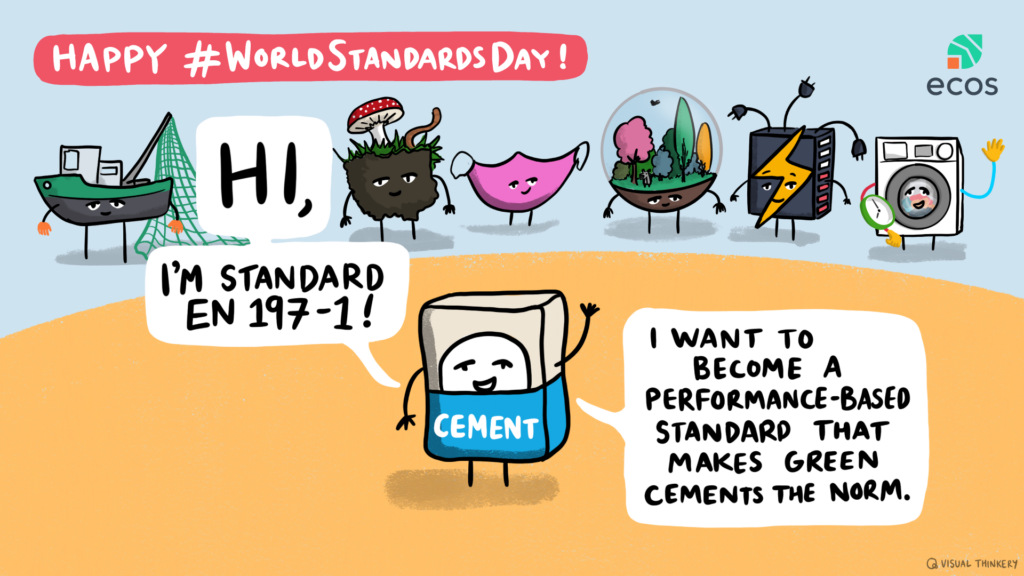
Cement and concrete production accounts for 8% of global CO2 emissions – a staggering amount when you consider that low- and zero-carbon alternatives already exist that are both scalable and cost-effective. To make these alternatives the norm, we need a major update of cement and concrete production standards – including the European standard EN 197-1.
Despite new research and innovations, standards are still primarily tailored to the production of traditional Portland cement. They were created before decarbonisation was a fundamental objective, so they are recipe-based and restrict us to high-carbon cement and concrete.
We need to decarbonise the sector – urgently. This is why ECOS is pushing standardisers to make EN 197-1 better for people and the planet. By shifting to a performance-based approach, we can open cement and concrete production to use more sustainable materials and make cement greener!
Find out more in this blog.
EN 50491-12-2: Helping us to use energy smartly
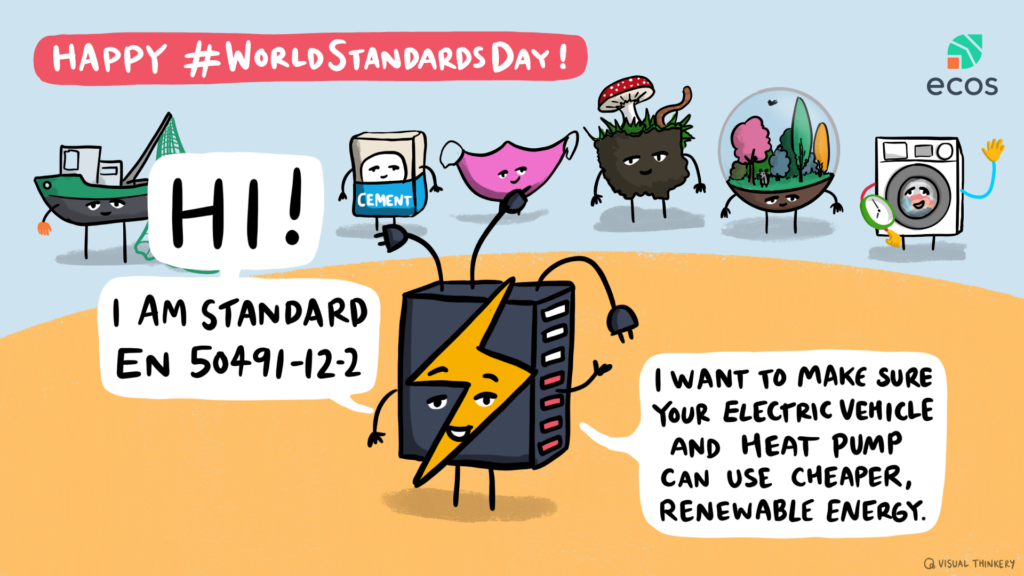
Standard EN 50491-12-2 helps to reduce power demand (and consumer costs!) at peak times by managing power flows inside buildings, including exchanges with electric vehicle charging stations, household appliances, heat pumps, and solar panels. Signals from the electricity grid and our own user preferences can allow us to choose when we consume the most energy.
We need a smart, flexible electricity grid that can cope when we arrive home after work and plug in our electric cars or turn on our heating on the first cold day of the year. Enter standard EN 50491-12-2! When implemented, our electric vehicles and appliances will help to stabilise the grid, instead of overloading it, and at the same time optimise our use of renewable energy.
This standard has been so successful at European level that it is now being discussed at global level by the IEC (International Electrotechnical Commission), with the goal of making smart grids a reality for even more people.
Find out more in this blog.
CEN/TC 205/WG17: Making face masks safely reusable and more sustainable
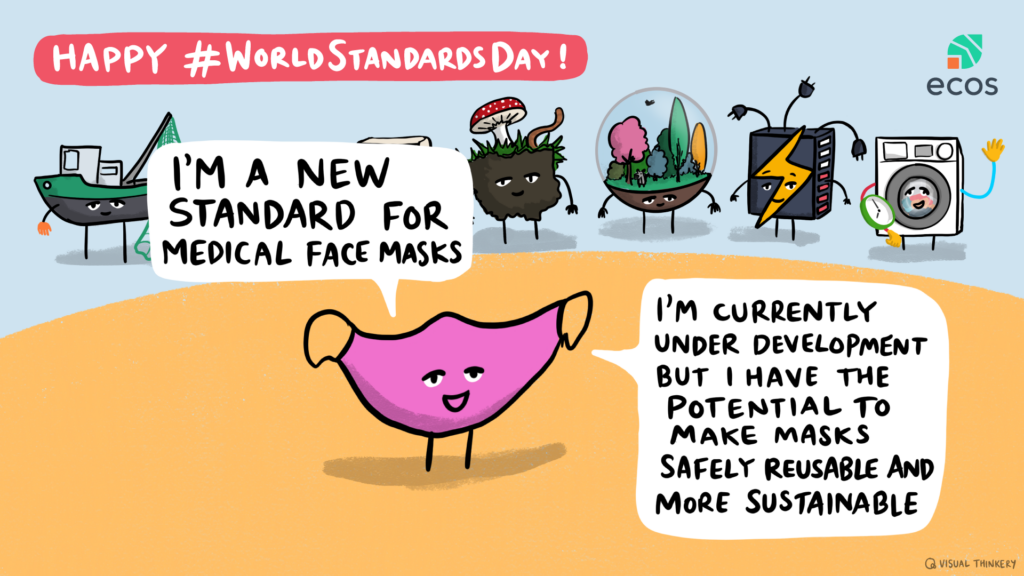
A new face mask standard is under development (CEN/TC 205/WG17) that could make reusable masks the norm. Infection protection masks are a critical piece of personal protective equipment (PPE) used to fight the spread of infection – something we all learned quickly during the COVID-19 pandemic. But disposable, single-use masks create waste.
Many single-use plastic products are being successfully replaced with reusable alternatives, but face masks have not yet been properly considered for reuse. Including reuse options in the CEN/TC 205/WG17 standard could help to mainstream reusable masks.
By using standards to address the environmental and health impacts of this new waste stream, we can reduce the volume of unnecessary single-use PPE without compromising on safety. The safe reuse of face masks has a huge potential to reduce tonnes of waste and is a great example of how standards can meet global challenges and tackle new problems.
We want all standards to realise their potential
Some of the standards above are already doing a good job, others are brimming with potential. Follow us to track what happens next in the lives of our evolving cast of characters.

 By
By 
